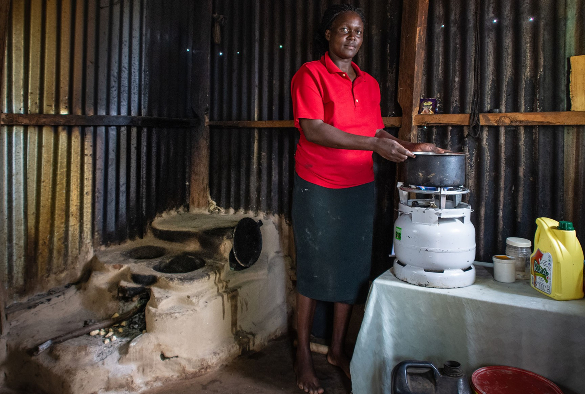A new policy brief highlights how the reintroduction of 16% Value Added Tax (VAT) on liquefied petroleum gas (LPG) in Kenya is reversing progress made in clean cooking adoption.
LPG is a cleaner cooking fuel and rapidly scalable option that is key to achieving Kenya’s ambitious target of 100% clean household energy access by 2028. The Kenyan government zero-rated VAT on LPG in 2016 but re-introduced a 16% standard rate of VAT in July 2021.
A National Institute for Health Research (NIHR) group, involving experts from the University of Liverpool, University College London and Moi University working in collaboration with the Kenyan Ministries of Health and Energy, found that half of urban households cooking with LPG in Western Kenya decreased their consumption following the VAT reintroduction. Three quarters of these households consequently reported cooking more frequently with polluting alternatives such as charcoal and wood.
Families most likely to be negatively impacted by an increase in price of LPG were those who are resource poor and informal workers with minimal safety nets. These families, who were the lowest consumers of LPG prior to the reintroduction of VAT, cannot meet the increased costs of the clean cooking fuel. In some cases, families reported that higher LPG prices left them with less money at hand for to meet other essential household expenditure.
The findings demonstrate that the VAT reintroduction has led to an exacerbation of inequalities in access to clean cooking fuels in Kenya. Associated reductions in use of LPG are projected to lead to a loss of 46 billion Kenyan Shillings (USD 400 million) to Kenya’s economy over the next decade due to time losses, healthcare costs, and damage to climate.
The authors warn that swift action is now needed, stating: “As a consumer price mitigation measure over which it has control, the Government of Kenya should urgently consider re-establishing a zero-rating for VAT on LPG. We are aware that a Government Inquiry into the causes of the increase in prices of petroleum has recommended a reduction of VAT in LPG to 8%. However, we believe this reduction would not be sufficient, and recommend returning to zero-rating of VAT on LPG to best support Kenya’s commitment to 100% access to clean cooking by 2028 and the encouraging progress made in adoption of LPG for clean cooking between 2016 and July 2021. This will subsequently reduce deforestation and prevent deaths and disease (with associated healthcare costs), while maintaining tax revenue through the protection of household budgets.”
Read the full policy brief ‘COP26 and SDG7 goals under threat: 16% VAT on LPG reverses progress made in clean cooking adoption in Kenya’ on the CLEAN-Air(Africa) website.
Further information:
